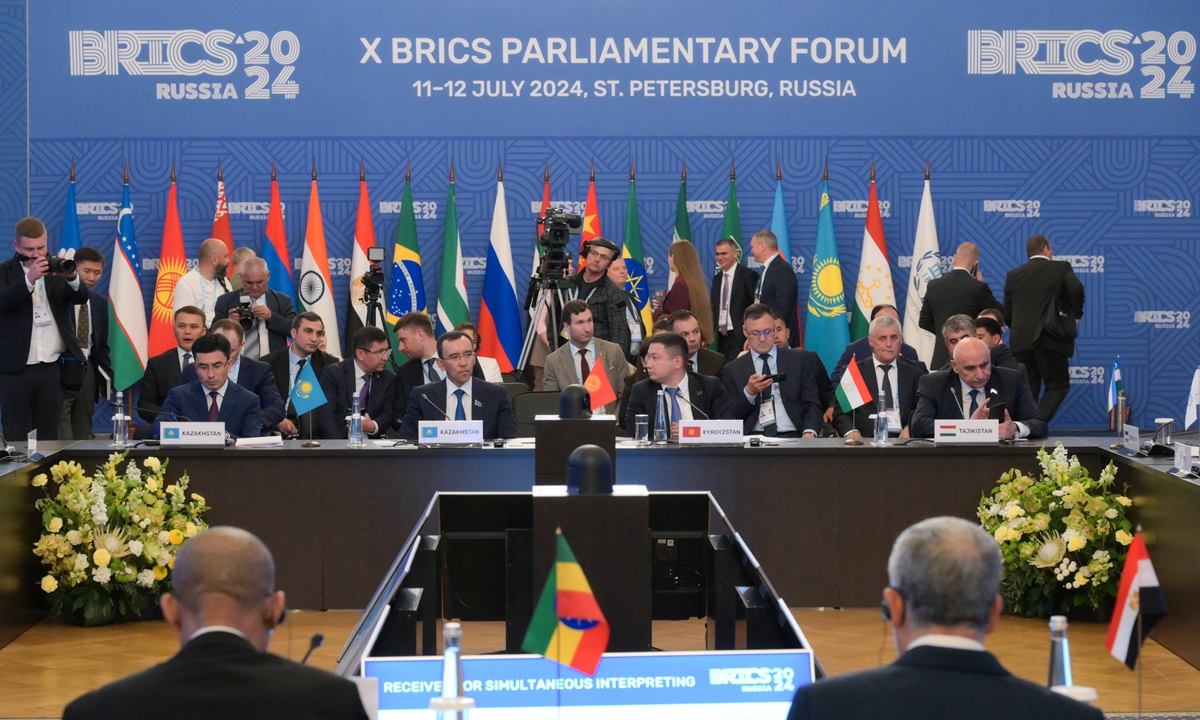
Photo shows the plenary session in an expanded format of the 10th BRICS Parliamentary Forum held in St. Petersburg, Russia, on July 12, 2024, focusing on inter-parliamentary cooperation in humanitarian and cultural spheres. Photo: VCG
In addition to Malaysia's official application to join BRICS, Belarus and El Salvador have added more voices to a chorus of countries seeking to join the group. Experts view the countries' increasing interest as a reflection of the strong consensus among developing nations on the significance of this cooperation mechanism, which is injecting more confidence and vitality into the development of Global South.
According to Xinhua News Agency on Sunday, Malaysia has sent a letter of application to join the BRICS organization to Russia, the BRICS rotating chair, expressing openness to participate as a member country or as a strategic partner.
BelTA News Agency on Monday quoted Belarusian Minister of Foreign Affairs Maksim Ryzhenkov as saying that Belarus expects to be among the top 10 countries to get the status of a BRICS cooperation partner. According to Ryzhenkov, Belarus views BRICS as an efficient platform that brings together global power players, a place where Belarus can promote its foreign policy interests, build economic ties and grow trade.
In another development, El Salvador is reportedly studying the possibility of joining BRICS and may ask to do so in one to two years. According to the Sputnik news agency on Monday, El Salvador is interested in attracting foreign investment, primarily from the BRICS countries, as the country understands that it needs to diversify its economic ties and not to be focused only on the US and the World Bank.
"A growing number of nations seeking to join the BRICS demonstrates the effectiveness of this cooperation mechanism, which has strong appeal for developing countries," Song Wei, a professor from the School of International Relations and Diplomacy at Beijing Foreign Studies University, told the Global Times on Wednesday.
BRICS has solidified the consensus among developing countries and has emerged as a powerful advocate for the development needs of these countries. Whether it is advancing economic collaboration or advocating fairer global governance, the BRICS has consistently championed the practical interests of developing countries, Song said.
Song noted that these applicant countries, located across different continents, have experienced rapid development in recent years. In response to their growing development needs, they are looking to leverage the BRICS mechanism to unlock new opportunities for continued growth.
The BRICS is the acronym for an emerging-market cooperative mechanism that initially included Brazil, Russia, India, China and South Africa. In January, the bloc expanded its membership to include Saudi Arabia, Egypt, the United Arab Emirates, Iran, and Ethiopia. Besides, more than 30 countries, including Indonesia, Vietnam, Venezuela and Kazakhstan, have filed applications to join.
The continuous expansion of BRICS injects confidence and vitality into the development of the Global South, Song said. "For the developing countries, the path to development lies in united self-improvement and strategic alignment through economic and trade cooperation, rather than excessive reliance on support from developed nations," Song added.
Experts also highlighted the sharp contrast between the BRICS and exclusive circles driven by US-led West that draw ideological boundaries, and even implement their economic hegemony. "The BRICS model is based on expanding consensus among developing countries through equal and mutual negotiations," Song noted.
Through collaboration among developing countries, they will amplify their collective voice, ultimately contributing to the cause of fairness and equality in global governance. This collaboration will be instrumental in addressing the development needs and demands of developing countries, analysts said.
Lin Jian, a Chinese Foreign Ministry spokesperson, said at a routine press conference on Monday that the development and expansion of the BRICS mechanism reflects the trend of the times, serves the interests of relevant countries, and provides a strong driving force for multipolarity in the world and greater democracy in international relations.
"BRICS members have responded to the hope of various parties with all sincerity and advanced relevant process with pragmatic action. We welcome more like-minded partners to join BRICS cooperation and work together to make the international order more just and equitable," Lin said.
Li Yawei contributed to this story




